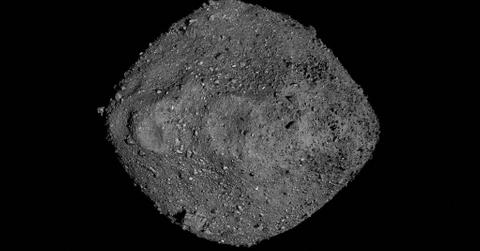Preparing for Impact: NASA's ‘Planetary Defense’ System Searching Space for Asteroids Capable of Causing 'Extinction Event'

A mosaic of the asteroid Bennu, which could crash into Earth September 24, 2182.
In the realm of preparedness, while some individuals may have their trusty weather radios for approaching storms, the looming threat of an asteroid poses a different challenge. What measures should one take when faced with the potential arrival of an asteroid, possibly within a mere 24-hour window?
Recent insights shed light on NASA's strategy for alerting not only the United States but also other concerned nations regarding potential celestial threats.
This information comes at a pertinent time, coinciding with the forecast of three house-sized asteroids passing in relatively close proximity to Earth recently.
According to NASA's online Asteroid Watch, the closest of the trio was expected to skim past the planet at a distance of 280,000 miles — a margin slightly exceeding the distance of the moon to Earth.
Yet, for those who aren't regular visitors to the website, the sudden appearance of an asteroid could catch them off guard. NASA's database accounts for approximately 150 sizable asteroids with the potential to trigger what they term an "extinction event."
Lindley Johnson from NASA's Planetary Defense Coordination Office emphasizes the urgency: "We definitely want to find all those before they find us."
The concept of "Planetary Defense" underscores a serious concern. Established in 2016, the office addresses threats from both asteroids and comets, although Johnson clarifies that there's no hotline on his desk for alerting global leaders.
"We do have formal procedures by which notification of a significant impact would be provided," Johnson reassures.
The response protocol hinges on factors such as the asteroid's size and its projected impact location, according to the New York Post.
If the threat is confined to the United States, NASA will issue a public statement while informing the White House. This could involve smartphone alerts and televised announcements.
Never miss a story — sign up for the Front Page Detectives newsletter. Be on the scene the moment news breaks.
For scenarios implicating other nations, an international entity steps in. The United Nations houses the "Office of Outer Space Affairs," aimed at harnessing space data and technologies to preempt and manage disasters, as outlined on UNOOSA's website.
In mid-January, the inaugural meeting of the International Asteroid Warning Network's steering committee convened, marking a milestone after five global exercises conducted over the past decade to ready nations for potential catastrophic impacts.
Acknowledging the uptick in detection of smaller asteroids, NASA underscores the importance of these occurrences as practical exercises.
Become a Front Page Detective
Sign up to receive breaking
Front Page Detectives
news and exclusive investigations.
